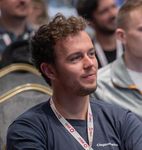Who we are

Lena Pinkert [representative] - Biological Psychology Lab
Perhaps you have already noticed that some older people have trouble walking and talking at the same time. This means they stop when they want to say something and only continue walking afterwards. People with neurological diseases, such as Parkinson's, also experience difficulties when trying to do two things at once. With my research, I aim to use functional magnetic resonance imaging (fMRI) to discover which mechanisms in the brain cause older people to struggle with doing two things at once and how this might potentially be improved with the administration of medication.

Stephanie Rosemann [substitute] – Biological Psychology Lab

Mica Pec - Biological Psychology Lab
Can you think of a time you struggled to follow a friend’s words in a noisy coffee shop? The chatter and clinking dishes make it hard to hear, and despite focusing, you still miss parts of the conversation? The effort might feel draining. For many, especially older adults, this is more than an occasional frustration, it can be a daily challenge.
My research explores how the brain and body respond to these difficult listening situations, particularly in older adults with age-related hearing loss. By analyzing brain activity using fNIRS and pupil changes, I aim to uncover how listening effort affects speech understanding in noisy environments with hearing aid users.

Sophie Paape – Neuropsychology Lab
Changes in walking and speech patterns are among the earliest indicators of declining cognitive abilities. In my research, I use small motion sensors worn discreetly behind the ear to continuously measure these subtle changes in the everyday lives of older adults. I focus especially on situations where people walk and talk simultaneously—so-called dual-task situations—because they offer sensitive clues to cognitive impairments. The goal of my work is to use these movement patterns as digital biomarkers to help detect emerging cognitive issues earlier and improve diagnostics.

Brinda Valsaraj - Biological Psychology Lab
Since COVID-19, we shifted a lot to online meetings and conferences. I’m interested in what happens in the brain of our partner and us during these online conversations and tasks of making decisions. I’m trying to see if you are in ‘sync’ with your partner during these times. For this I work with an interdisciplinary group of experts, in Psychology at the Biopsychology Lab in Oldenburg, in Computer Science at the Cognitive Systems lab in Bremen and in Economics at Karlsruhe Institute of Technology in Karlsruhe within the KD² School PhD program. We try to understand the changes in brain activity using fMRI (functional Magnetic Resonance Imaging), and heart rate measurements while they talk and solve the tasks together.

Foroogh Razavi - Experimental Psychology
Inhibitory control - the ability to suppress automatic, impulsive or inappropriate reactions - is very important for many everyday tasks. As we get older, this ability often declines, which can make it difficult to react quickly and appropriately in certain situations or to suppress habits. People with Parkinson's in particular often have difficulties with such tasks. In my project, we are investigating whether inhibitory control can be improved in healthy older people and Parkinson's patients by modulating their brain activity with non-invasive brain stimulation.

Motahari Delbari - Neuropsychology Lab
My research uses a combination of transcranial magnetic stimulation (TMS) and electroencephalography (EEG) to study how brain networks respond to external perturbation. By applying magnetic pulses and recording the brain’s immediate electrical responses, cortical excitability and connectivity can be directly measured. Ultimately, this work aims to advance our understanding of brain network function and lay the groundwork for personalized neuromodulation strategies in clinical and rehabilitation contexts.

Christiane Thiel – Biological Psychology Lab
We use functional magnetic resonance imaging (fMRI) to investigate how the brain manages to pay attention or remember, particularly in challenging real-life situations, such as following a conversation with multiple speakers. We are also interested in how these processes change in various conditions, including hearing loss and neurological disorders and aim to enhance cognitive performance through neuromodulation techniques.

Mandy Roheger – Ambulatory Assessment in Psychology
We investigate cognition and behavior in older people and in clinical populations (e.g. people with Alzheimer's dementia or Parkinson's disease) in an outpatient setting. Our research also focuses on outpatient non-pharmacological interventions (e.g. cognitive training) for the prevention of cognitive decline. We want to record cognition and behavior in people's everyday lives in order to better understand and improve outpatient neuropsychological diagnostics and integrate effective non-pharmacological interventions into patients' everyday lives.

Silvia Korte [former representative] – Neurophysiology of everyday life

Ann-Kathrin Knak – Psychological Methods and Statistics & Big Data in medicine
Even months after a COVID-19 infection some people are still severely restricted in their everyday lives. For example, they suffer from exhaustion, pain, shortness of breath or difficulty concentrating. The symptoms vary greatly from person to person and can change over time. I would like to find out why varying complaints improve or worsen in different people. I focus particularly on neurocognitive symptoms, for example difficulties with attention, memory or finding words. The results are supposed to lead to a better understanding of this new disease and provide ideas for therapeutic approaches.

Nadine Jacobsen – Neuropsychology Lab

Sreekari Vogeti – Experimental Psychology Lab
Hearing loss is common and hearing solutions that are currently available are not satisfactory for all users. Therefore, many researchers are working on improving existing solutions and developing new ones. I am investigating whether a low intensity current (transcranial alternating current stimulation) that is applied to the scalp can help us to hear better. This project is a part of the Hearing4all cluster of excellence Hearing4all.

Mareike Daeglau – Neuropsychology Lab
My research interests lie in investigating the influence of contextual factors on perception and learning. I am particularly interested in how we can communicate effectively with each other despite distracting background noise and the role of social factors such as sympathy. In my studies, I measure brain activity in audiovisual, virtual environments to improve attention and understanding of speech. In addition, I have investigated the effects of sleep and distraction on motor imagery, a technique in which movements are only imagined and not executed and used in rehabilitation, among other things. By using mobile technologies, I aim to make my research findings transferable to people's everyday lives.








